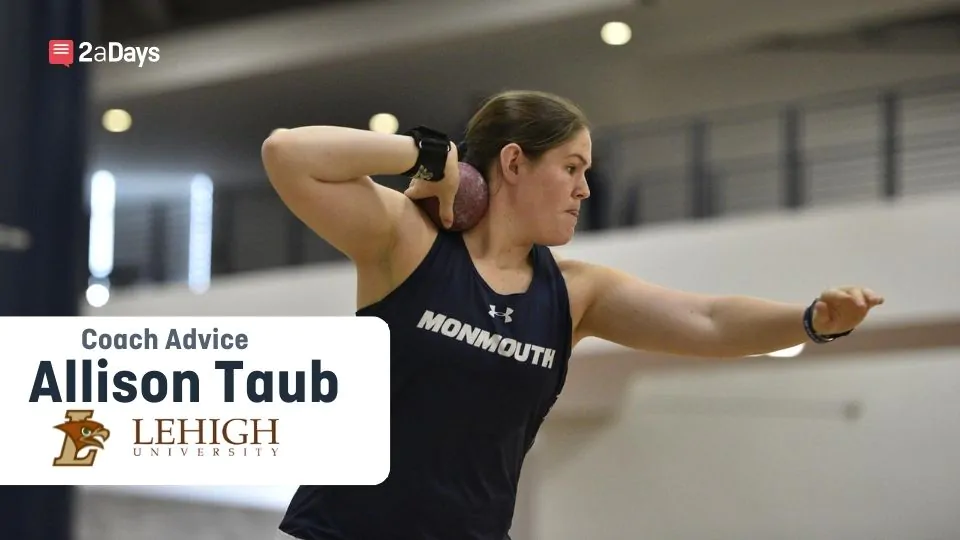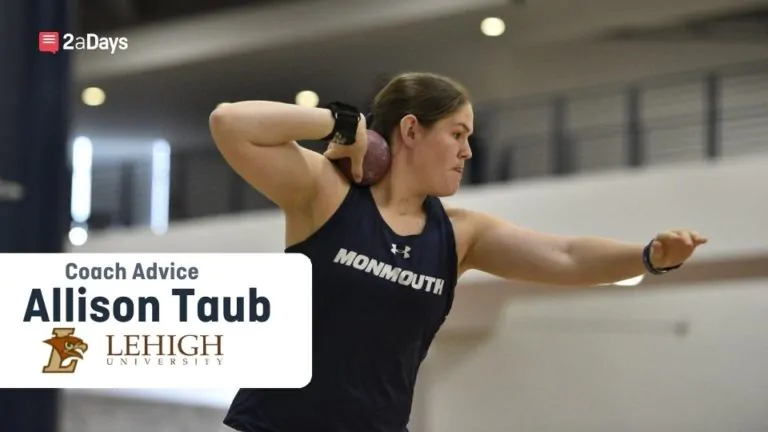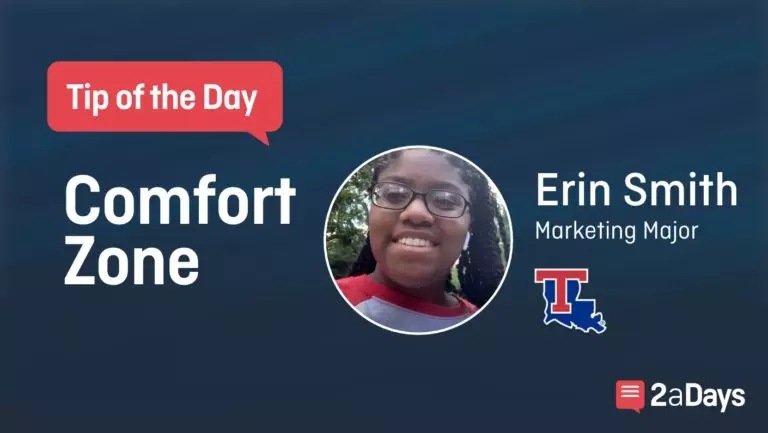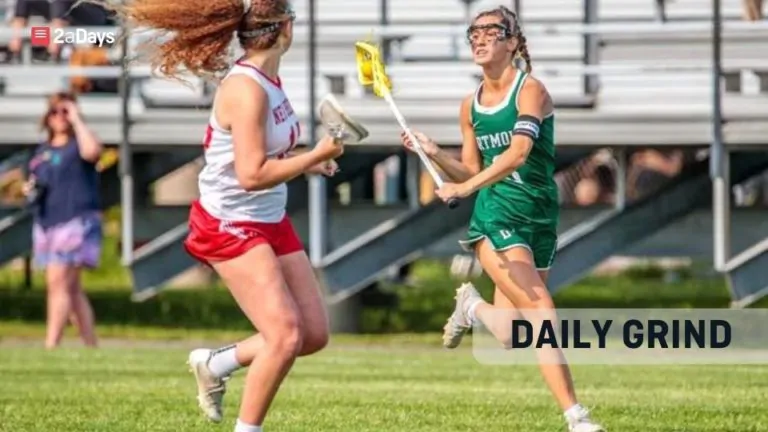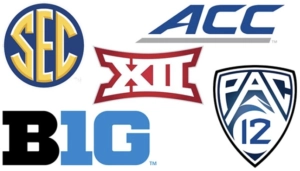Coach Interviews are posted every Monday for recruiting advice, what to look for, and more.
Coach Taub is an assistant coach for Lehigh University's track and field team going on her second year of coaching. Coach Taub was a four-year standout at Monmouth University collecting 8 team MAAC Championships and has also 5 individual MAAC Championships. Currently, she holds the Hawk's school record in the shot put and is top 5 all time in discus as well as a record at Lehigh University. Here's what all athletes can learn from Coach Taub about the recruiting process, college athlete life, and more.
What was your athlete experience like?
Growing up I did all different types of sports, basically any sport you can name I played at some point. When I got to high school I was more of a soccer, basketball, and track. And then going into college I had to choose between basketball and track and ended up choosing track like stated earlier. I was a walk-on at Monmouth for javelin and I wanted to push myself and see what it would take to compete in Division 1 level because my marks in high school weren't the best. My experience at Monmouth was absolutely incredible. By choosing Monmouth alone I was given the opportunity to compete every weekend not only grow as an athlete but also grow as a person in general. I would say being at Monmouth was the first time on my track that I feel like the thrower really matters because in high school you kind of just go off and compete in the middle of nowhere and everyone was always so loud and cheered for us all the time. It truly was like a family atmosphere at Monmouth and I can do a hundred percent say I would never change my decision.
Related: Rate your Coaches, Facilities, and Campus Visits
What was your major at Monmouth University?
So I always said I thought I never wanted to coach but my major was social work so I've always wanted to help people and I do have a social work job as well but I think wanting to help people also got me into the coaching career. I just love the sport of track, I love learning and I love seeing athletes get better so I would say definitely my major had an impact on that and I'm just excited to see where this continues to go.
Due to your many records and PR's, would you say it took a lot of effort and dedication to make these happen?
First of all, shout out to all student-athletes. I believe being a student-athlete at any level Division 1 to Division 3 is a lot of dedication and hard work. I still take pride in being a walk-on at Monmouth and leaving with the school record. If it wasn't for my coaches, my fellow athletes, that competed with me I would have never had the confidence in myself to get the marks I did. Having teammates around me wanting to see me succeed as much as I wanted to succeed, just made it way easier to stay motivated and once you come to practice every day and go to the weight room and work hard.
What is your biggest recommendation for someone trying to overcome their current PR? What would you say works best?
I would say my biggest recommendation to try and overcome a current PR or just be able to PR is not worrying about PRing and worry about the little things. Going to practice and fixing the things you need to fix. I truly think that throwing and track in general is 50% mental 50% physical. And that mental part is so important being able to mentally tell yourself ‘I can do this' is just the first step of actually being able to do it. So going into a meet with confidence and trust in your training and trust in your coaches I think is when the PR's come. When you start questioning and you and your coach may believe in the same thing I think that's when the struggle happens.
Related: 5 Top-Rated DI Track & Field Coaches
When pushing an athlete to become better, when would you say is the right time to let them do it on their own and when is the right time to help them?
It's all about knowing your athlete. I think being a coach you need to understand every athlete is not the same. Some athletes need that harsh love and that's all I was as an athlete, but then others need that caring side and can't be yelled at, they have to be talked to in a different way. I think that is so important. Knowing your athlete on their athletic side but also their personal side. I think by knowing them more personally you know which day is “Hey like they're showing up to practice. Let me just check in on them, but let me let them do their thing because they're actually stressed today. I'm not going to push them and stress them out more.” So again I think it's all about knowing someone on a personal level and knowing when you can step in and when you can step back. When it comes to track, we peak at the end of the season, so you know you work all year, that week leading up to that last meet. That's when you really step back because the work starts at that point it's either going to happen or it's not going to happen. We can't fix the little things at that point. That's the biggest time I step back but also like I know there's days when I just have to let the athlete have their bad day. We'll talk later and then we move on.
In your opinion, if a college athlete is constantly not reaching their goal, what would be their best help?
The first thing is to sit down and find out what's going on. Is it ‘hey my training's not working for you' or is ‘something happening outside of track and you're not just mentally off here'. I think talking to them and understanding them again on a personal level and finding out what you can do to help them. It might be changing the training and might be recommending seeing a psychologist. Or sometimes we have some eating disorders in track so talking to a nutritionist and finding out what we can do to help you immensely because at the end of the day mental health is number one. I think that the main thing we see when an athlete is not hitting their goal is not just training, but something else bigger is happening in their life.
As an assistant coach, what do you specifically look for in a recruit or current athlete?
I would say that the basic thing every coach looks for in any sport is someone who is going to work hard, someone who's gonna come in and make an impact but work hard every day. Again, throwing is way different than recruiting from other sports. Obviously have a solid base and understanding of the sport. They need to know half their sport is in the weight room, and they need to be willing to apply that. I look for an athlete whose form is already there. Height, weight, that's a big advantage in throwing. And their numbers in the weight room.
What's your biggest advice on overcoming one's biggest fear?
So I would say when you want to overcome your fear you gotta face it. I know that's hard to say because everyone's fears are different but you need to face it one day and you need to just see what it's like. I have fears and I'm scared to face some of them but having someone that can guide you like a coach is so important and even a role model. A professor or someone in your life that can show you ‘hey we can take this next step or we can do it together'. And I think overcoming a fear has to be a team, overcoming your fear you're not able to do by yourself. So I think that's why team atmosphere is so important and whenever one plays a sport, I mean, sometimes one's fear is not being able to compete or just not being able to get the stand that the coach wants. But if you're captains and leaders and you all come together they can easily go away and we can overcome it.
What was your best memory at Monmouth University and why?
My best memory would probably be beating the school record. That season was just one I will never forget. I tore my ACL my sophomore year and I just never thought I would come back from it. Being able to break the school record at Lehigh University. That's pretty cool. It was awesome that day. Everyone was cheering for me, everything felt right, and I would say that's by far something I was striving for since my sophomore year and being able to do it was just incredible. I am also a team player. We went 8 for 8 at Monmouth when I was there so that's just something I'm super proud of and I can keep the legacy going.
Have a story idea or know an awesome athlete/coach we should interview? Email us at [email protected]
Image Credit: https://monmouthhawks.com/sports/womens-track-and-field/roster/allison-taub/8990
* Originally published on June 20, 2022, by Lilia Farach
